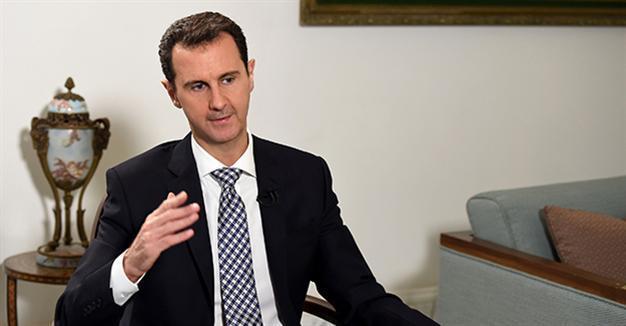Syria’s Assad says he is ready for truce if ‘terrorists’ don’t exploit it
BEIRUT/MADRID - Reuters

A handout picture released by the official Syrian Arab News Agency (SANA) on February 20, 2016 shows President Bashar al-Assad gesturing during an interview with Spanish daily El Pais in the Syrian capital Damascus. AFP Photo
Syrian President Bashar al-Assad said on Feb. 20 he was conditionally ready for a ceasefire, under the condition that a number of countries, including Turkey, which he accused of “sending terrorists and weapons” into Syria, halt their support to insurgents. Damascus refers to all insurgents fighting against the Syrian army and its allies as terrorists.
His comments were made as the Syrian opposition said it had agreed to the “possibility” of a temporary truce, provided there were guarantees Damascus’s allies, including Russia, would cease fire, sieges were lifted and aid deliveries were allowed country-wide.
“We have said that we are ready to stop military operations, but the issue relates to more important factors ... such as preventing terrorists from using it to improve their positions,” Assad told Spanish newspaper El Pais in an interview.
He also said any truce must ensure that “other countries, especially Turkey, are prevented from sending more terrorists and weapons, or any kind of logistical support.”
Turkey, other Sunni regional powers and Western countries have supported insurgents fighting against Assad, whose forces are bolstered by Iran, Russia and Lebanese Hezbollah.
Asked about the possibility of Turkey and Saudi Arabia sending ground forces into Syria, Assad said: “We’re going to deal with them like we deal with the terrorists. We’re going to defend our country. This is aggression.”
Attempts to negotiate a truce in recent months have failed. The latest round of talks at the United Nations in Geneva is being jointly chaired by Russia and the United States.
World powers agreed in Munich on Feb. 12 to a cessation of hostilities that would let humanitarian aid be delivered in Syria.
The ceasefire was scheduled to start a week later, but did not take effect. Syrian army offensives continue unabated across the country, backed by Russian air strikes.
Assad said last week he would keep “fighting terrorism” while peace talks took place, vowing to retake the whole country.
He told El Pais his troops were now close to fully controlling the northern city of Aleppo and were advancing towards the Islamic State of Iraq and the Levant stronghold of Raqqa province.
Once he has control of the country, Assad added, the next step would be to form a national unity government that would lay the groundwork for a new constitution and general elections.
